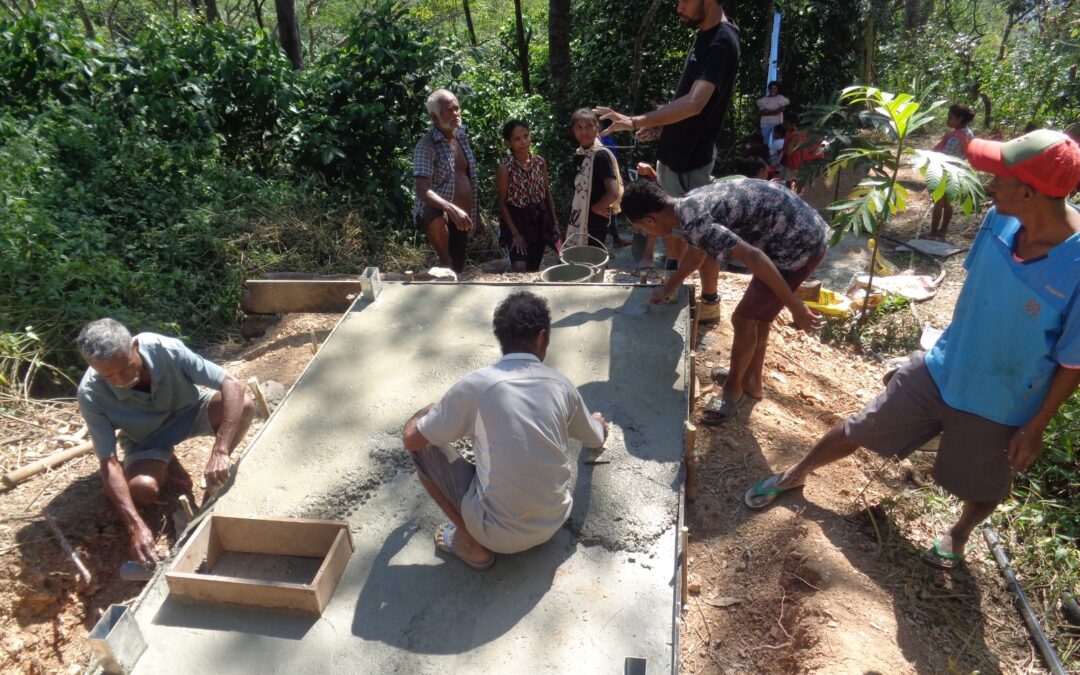Caption: Darlau residents supporting the construction of the permanent water supply system.
In Darlau, a village in Timor-Leste, collecting water was until recently a slow and physically demanding task. Every day, residents would trek to the only springwater supply and carry buckets back up a steep hill. This job was generally done by women and children – a round trip that could take up to 2 hours, and in extreme heat during summer.
Darlau is located only 11 kilometres southeast of the capital city of Dili, but its location and topography mean its 1200 residents are highly isolated. The village is set on mountainous terrain and is reached by steep, muddy roads, which are often cut off by floods during the wet season. Basic support from the government often fails to reach Darlau, which has only recently received electricity.
EWB was introduced to the community in May 2022 through local Timorese non-government organisation, Permatil, when EWB was seeking to run participatory design workshops with a community that could benefit from engineering solutions. Through these workshops, the EWB team heard from the community about a range of challenges they faced in everyday life, spanning household sanitation, agriculture and menstrual health and hygiene.
As the EWB team listened to and observed the community, it became clear that many of these challenges were linked to an overarching problem – Darlau’s limited access to clean, drinking water. With EWB’s extensive experience in water, sanitation and hygiene (WASH), the team were confident that they could solve the community’s water supply problems.
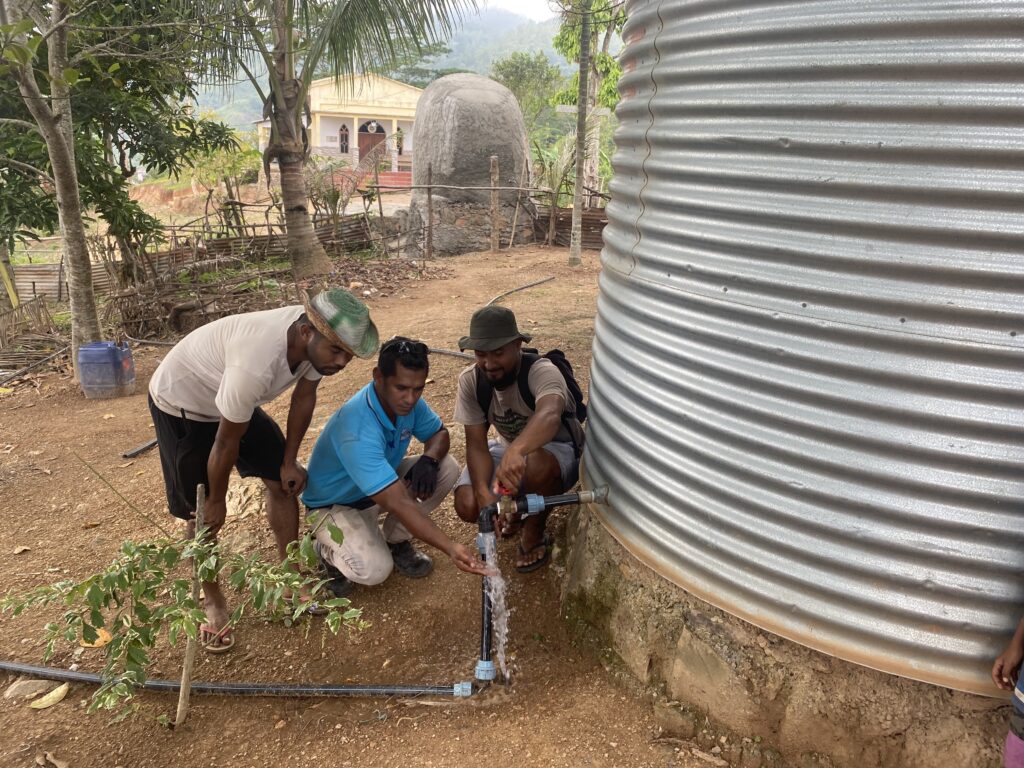
EWB and Darlau residents testing the temporary water supply solution installed in September 2022.
As the project took shape, the EWB team was faced with the challenge of designing a water system for an isolated, mountainous area. They also needed to gain the trust of the community, who were wary of trusting and sharing knowledge with outsiders following unsuccessful or short-lived past attempts at rehabilitating the water supply.
Over the next year, EWB worked closely with the community to build trust and design a water system that would work effectively in the terrain, meet the community’s needs and lessen the burden on women and children for water collection.
Fostering trust and deep understanding
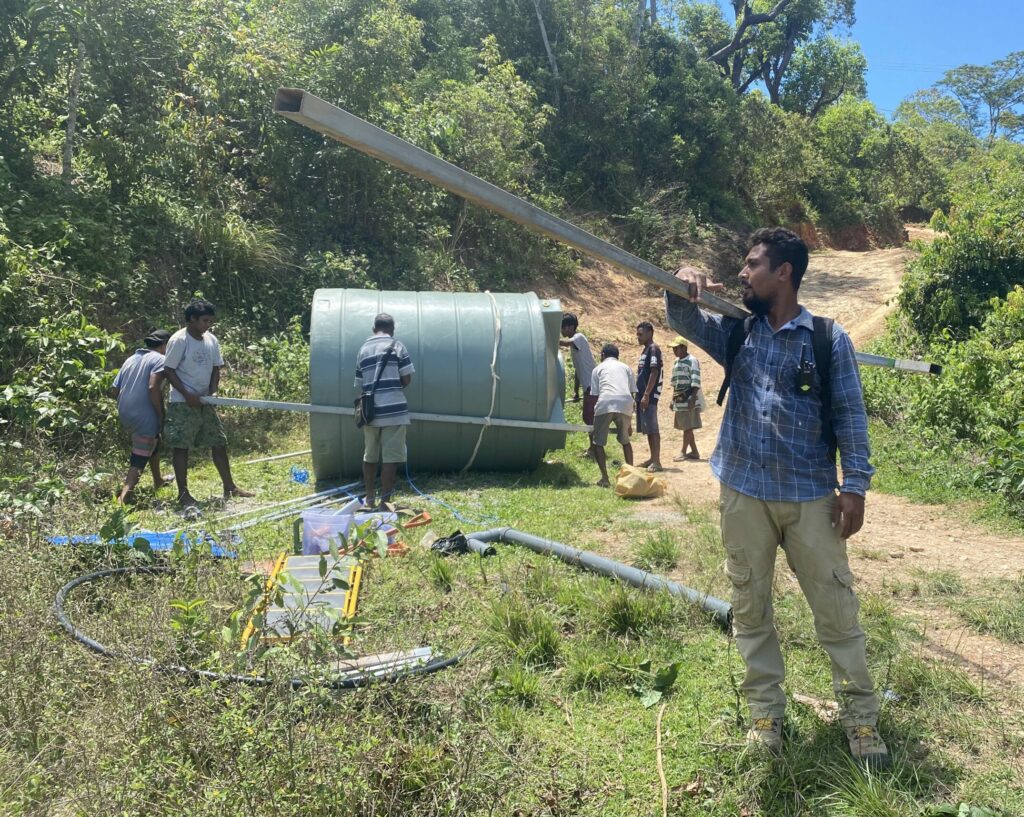
EWB Technology Development Lead, Romeus, working with Darlau residents to rehabilitate the existing water supply in the community.
In May 2022, EWB started its consultation with the community through focus groups and participatory design workshops. These workshops, run over the course of a week, were an important part of EWB’s use of human-centred design to identify and explore problems that the Darlau community was facing. Used in a range of projects, EWB’s participatory design process combines a variety of formats and exercises, including group discussions to learn about the history of the community, interviews with community members in their homes, and focus groups honing in on gender-specific issues.
As the EWB team continued to learn more about Darlau, a fuller picture emerged. It became clear to the team that EWB’s consultation and design process had to be gender responsive. Women and children were largely responsible for collecting the water for cooking, drinking, bathing and washing clothes.
As women within the community felt much of the burden of water collection, it was important for EWB to integrate their experiences into developing a solution. The team prioritised improving female participation in workshops to identify gender-specific issues and later established a majority female Group Management Facility, who lead the operation and maintenance of Darlau’s water facilities.
Building the water system
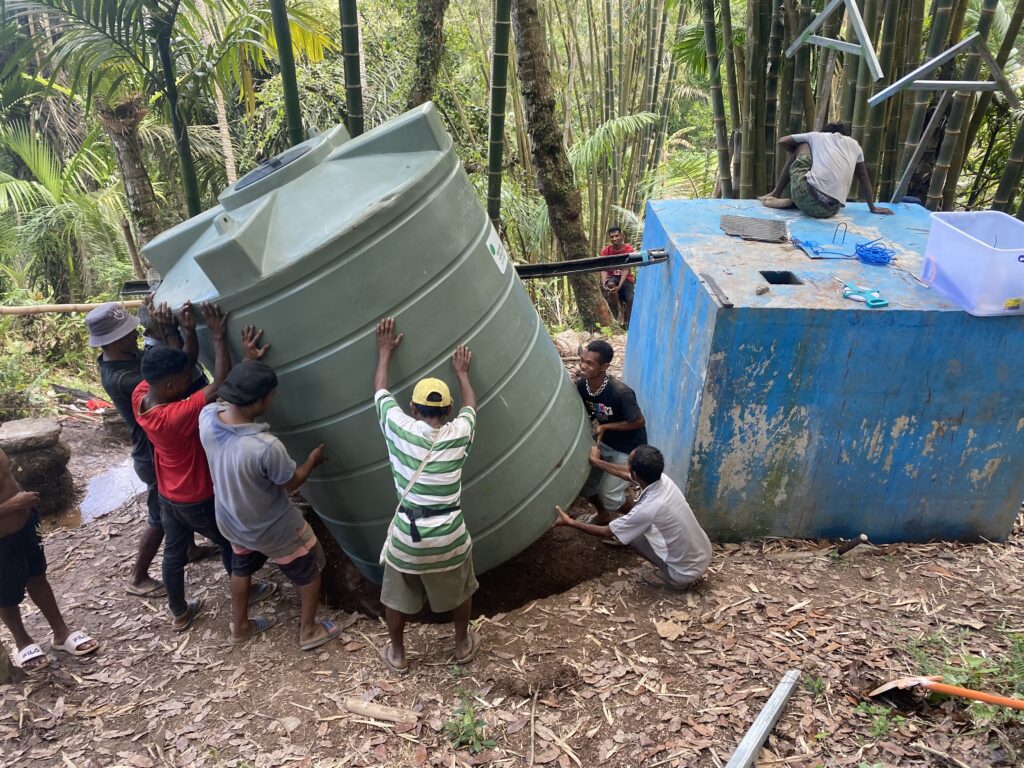
Darlau residents supporting the installation of the temporary water supply system.
Navigating the mountainous terrain was a challenge for the team during the wet season that occurs between December and May, when heavy rain floods steep roads and blocks access to Darlau. To get ahead of these challenges, the EWB team swung into early action in July 2022. The installation of a temporary water supply solution in September marked a turning point in the EWB and Darlau relationship, with greater trust and goodwill fostered now that a functional solution had been delivered. Improved collaboration and sharing were key to the design and implementation process, with the community sharing vital knowledge of local geography and existing infrastructure.
The community had been hesitant to share details about their natural resources and springwater due to its spiritual significance and the cultural practices associated with it. Building on the trust that had been established following the installation of the temporary water supply solution, EWB was given the location of a secret spring in February 2023, marking another significant milestone. The spring was located in challenging terrain that required specific expertise to address. Prior to concreting this natural spring, EWB was invited to a cultural ceremony conducted by the community to appease the spirits traditionally watching over the mountains.
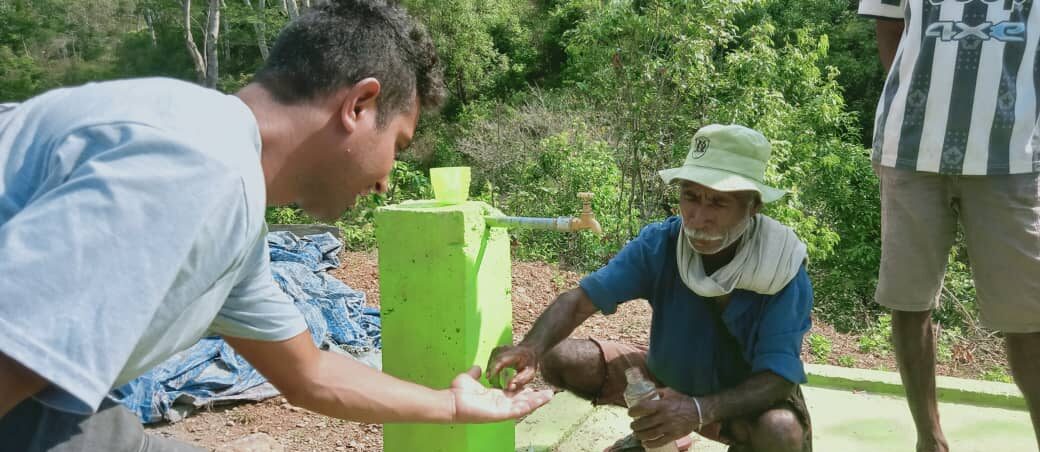
EWB attending a cultural ceremony held by Darlau residents in August 2023.
This became the site for the permanent refurbished water system, which EWB developed to avoid the design and maintenance issues that had affected previous water systems. EWB re-designed the water pipeline system to ensure it worked around changes in elevation in the area, and implemented an automatically controlled pumping reticulation system. The permanent refurbished water system was finalised in July 2023.
Responsibility for design, construction and maintenance of the new system was shared across different groups. The EWB Australia in Timor-Leste team, with support from Feto Enginhera interns, provided engineering analysis, detailed design, project management and construction monitoring. Feto Enginhera is a locally-led group of female Timorese engineers. They were assisted in fabrication and construction work by Dom Bosco intern volunteers. Local community members also took an active part in the project through ongoing discussions and negotiations. Some local volunteers took on labouring roles, encouraging a sense of community ownership of the water supply.
The refurbishment provided the community with a significantly improved and efficient water system. Compared to the previous system, the new system increased flow rate from 300 to 1500 litres per hour, and reduced pump power consumption by a factor of 4. More than 115 households and 1200 people now directly benefit from improved access to water. Average walking time to the water supply was reduced from 56 minutes to under 5 minutes, significantly reducing the burden on women and children.
Creating opportunities for Timorese female engineers
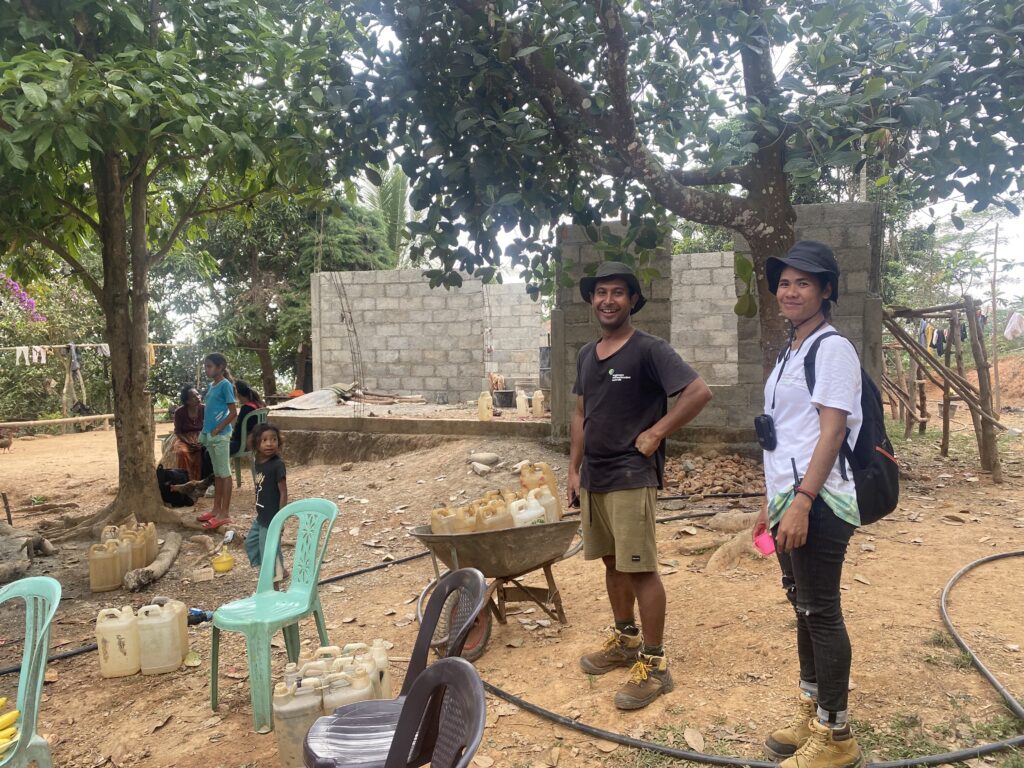
EWB Technology Development Lead, Romeus, and Feto Enginhera intern, Angelica, in Darlau.
As well as improving the daily lives of the Darlau community, the project also provided work experience for female Timorese engineers. The EWB team were supported by interns from Feto Enginhera, a locally led group which aims to support Timorese women in engineering and break down the social, economic and cultural barriers that women face in the sector. Female engineers in Timor often struggle to find opportunities where they can apply their skills, with gender stereotypes and a lack of female role models preventing them from fully participating in the industry.
A long-term partner of EWB, Feto Enginhera aims to address these challenges by fostering a network of female engineers and building their professional capability through work experience and mentoring. Feto Enginhera interns support EWB’s work in Timor Leste with engineering and project management and provide valuable assistance with community consultations.
Four Feto Enginhera interns were involved in the project in Darlau, gaining project supervision experience through construction monitoring. The Darlau project was an opportunity for these interns to build capacity and expertise, giving them firsthand experience in the planning, design and implementation of a community water supply project.
The successful involvement of Feto Enginhera interns fed into the development of EWB’s new Feto to the Front project, which recently secured funding through the US Embassy Small Grant Fund. Feto to the Front formalises the approach used in Darlau, with a focus on promoting the careers of Timorese women engineers by giving them a leading role in two water and sanitation projects. The program therefore has a dual approach, addressing both the immediate challenge of water access in rural Timor-Leste and the systemic challenge of gender inequality in the engineering sector.
Can you support next steps in Darlau?
To ensure the water system is well maintained, EWB is currently providing training and technical support to a newly formed community-led Group Management Facility. The GMF is specifically intended to support women’s equal involvement, with local women commenting that this will ‘help create gender equality’ and demonstrate their ability to contribute to the community through technical work. Selected community members will act as leaders to operate and maintain the water system.
The trust that EWB has now established with the Darlau community provides the groundwork to explore new projects to pilot. Moving forward, EWB plans to explore new potential infrastructure projects such as a large-scale ceramic water filter for schools or an accessible community toilet.
EWB Australia’s work in Timor-Leste receives support from the Australian Government through the Australian NGO Cooperation Program (ANCP).
If you would like to support EWB’s work with communities overseas, please donate here.


